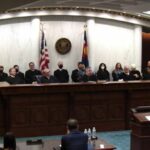Appeals court interprets police accountability law to block lawsuits against localities

Although people may sue individual law enforcement officers for violating their rights under a recently-enacted policing accountability law, Colorado’s second-highest court has clarified that lawsuits against local governments directly are not allowed.
The ruling from the Court of Appeals on Thursday sets state-level lawsuits apart from those brought under federal law, where the U.S. Supreme Court has permitted municipalities themselves to be held liable for their role in constitutional violations.
But a three-judge panel for the appellate court found the text of Senate Bill 217, enacted amid worldwide racial justice protests following the police murder of George Floyd in Minneapolis, did not permit claims against the employers of police officers.
“It does not mention any other individuals or entities that can be held liable under the statute” besides officers themselves, wrote Judge Lino S. Lipinsky de Orlov in the Aug. 18 opinion.
The legislature included several policing reform measures in SB 217 and it passed by a wide margin in the summer of 2020. One provision enabled the filing of lawsuits against police officers who violate a person’s rights under the state constitution or who fail to intervene to stop a violation. Qualified immunity, which shields officers in federal lawsuits from liability, does not apply under SB 217.
However, SB 217 did not appear to create an avenue for municipal liability, which is known under federal law as “Monell liability” — named for the 1978 Supreme Court decision of Monell v. Department of Social Services. Monell liability applies to local governments when an official policy or custom is behind an officer’s violation of a person’s rights.
Sometimes, municipalities may be held liable even if the officers who committed the constitutional violation are entitled to qualified immunity. Last year, a federal jury decided the city of Boulder owed $3.41 million for the wrongful arrest of a man due to the city’s lack of training for its police. The officers who performed the arrest did not stand trial.
In the case before the Court of Appeals, Vincent Damon Ditirro alleged two Colorado State Patrol troopers attacked and beat him unprovoked during a drunk driving stop in August 2018. Ditirro filed suit in Adams County against the troopers, the Colorado State Patrol, the Commerce City Police Department and the Adams County Sheriff’s Office. He based his claims on violations of his rights under SB 217.
After Commerce City briefly attempted to have the case heard in federal court, it returned to District Court Judge Jeffrey A. Smith, who dismissed Ditirro’s lawsuit. Smith concluded the troopers could not be held liable because they were state employees and SB 217 at the time only applied to officers employed by local governments. The legislature subsequently amended SB 217 to remove that restriction.
He also found SB 217 only permitted lawsuits against peace officers, and not the Commerce City Police Department or the Adams County Sheriff’s Office.
“Peace officer is clearly defined as person employed by a municipality — not the municipality itself,” Smith wrote. He acknowledged SB 217 allows government agencies to indemnify their officers should they be found liable, but at this stage in Ditirro’s case, there was no liability for the troopers.
Ditirro appealed Smith’s orders, and Adams County and Commerce City argued in favor of the trial judge’s interpretation of the law. They also indicated they were unsure why the jurisdictions were even named in the lawsuit, given that the troopers who allegedly used excessive force were not employees of theirs.
The appellate panel agreed that “under the facts of this case,” there was no way for Ditirro to sue either jurisdiction directly through SB 217. The panel declined to say what might happen if a plaintiff successfully holds an officer liable and the governmental employer is responsible for paying the judgment.
Matthew Cron, a civil rights attorney with Rathod Mohamedbhai who was not involved with Ditirro’s lawsuit, said it is possible the Colorado Supreme Court will ultimately weigh in on the question of municipal liability.
“This decision is inconsistent with the legislative purpose for the statute,” he said, “which was to remedy and curb police abuse.”
The case is Ditirro v. Sando et al.













